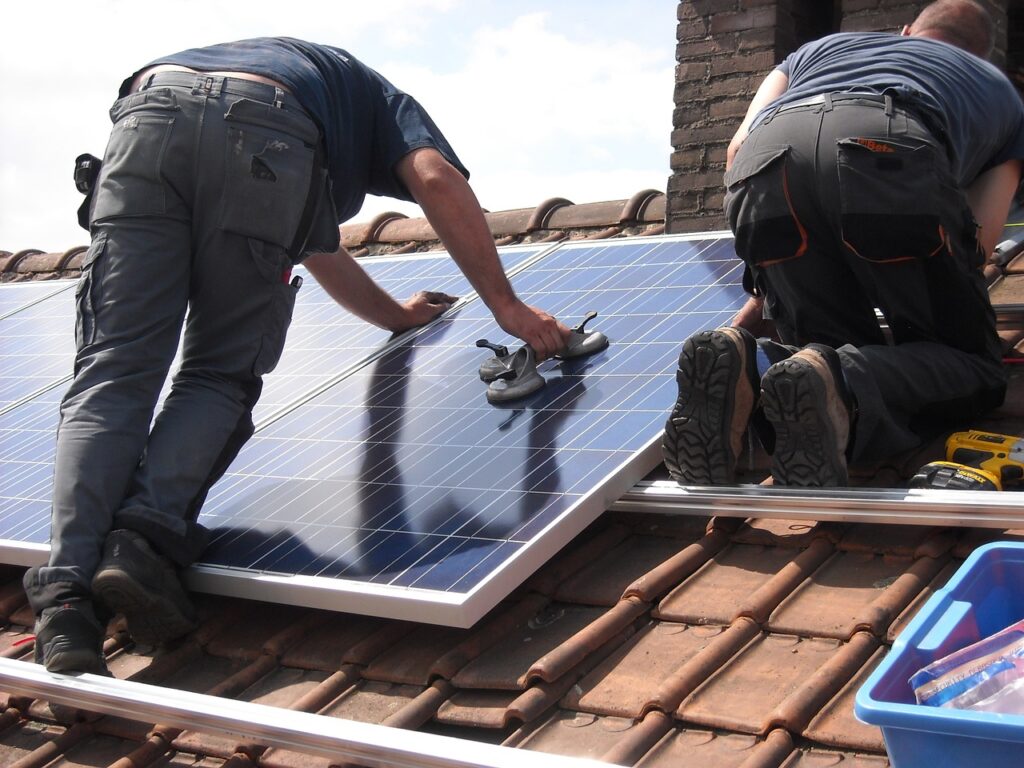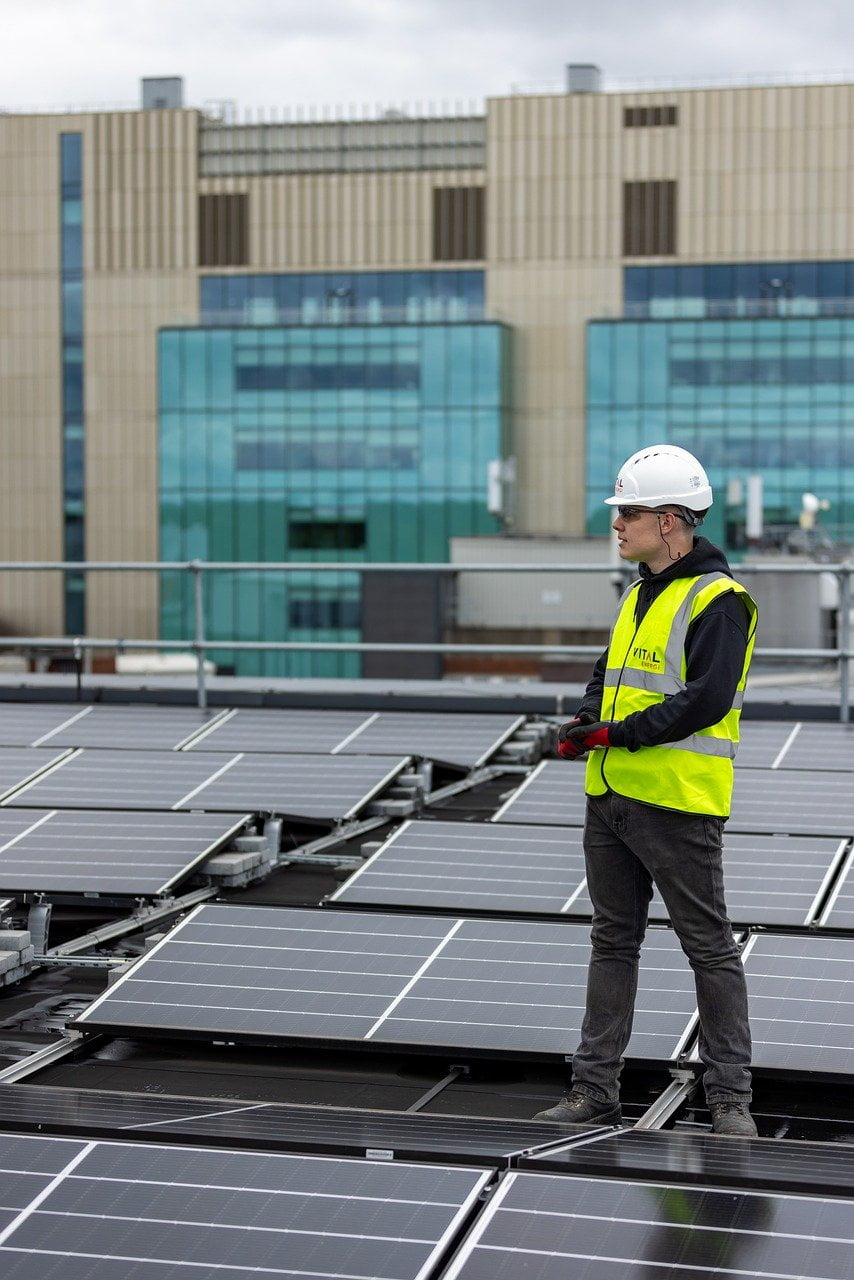
Solar energy users are growing gradually across the globe. Every household as well as every business institution is converting their energy setups to solar systems. Selecting the right solar installer to finance your B2B project can be a difficult task. With so many options available, it’s crucial to make a wise decision. This article will walk you through the essential steps to choosing the perfect solar installer to finance B2B financing needs.
How solar panels work
Solar cells: These are the main components of solar installers. Solar cells are made of silicon and installed on rooftops. These cells convert sunlight into DC through the photovoltaic effect.
Panels: Solar cells are integrated through a circuit called a panel to produce a large amount of power.
Invertor: It converts DC to usable AC.
These are the key components of a solar system. Sunlight is made up of tiny packets of energy called photons. When photons hit solar cells, they stimulate electrons, smashing them loose from their atoms. This causes the electrons to form positively charged “holes” and the free electrons to form negatively charged “holes. An electrical field is built into the design of the solar cell. The electric field forces the free electrons to the top of the solar cell and the holes to the bottom. Metal contacts gather the electrons from the top and the holes from the bottom. These contacts are connected by wires, creating a circuit. As the electrons pass through this circuit, they create electricity. Solar panels generate direct current (DC) electricity, which is then converted to alternating current (AC) electricity by an inverter. This conversion is necessary as most households and appliances operate on AC power.
Steps to Choose a Solar Installer to Finance B2B
Step 1: Identify your energy needs.
Before you start your solar journey, first determine your energy needs. Evaluate your peak energy usage, space availability for solar panels, rooftop conditions, and future expansion plans. This process helps you determine the size and scope of your solar project.
Evaluate financial planning.
Determine your budget according to your energy needs. Explore financial resources such as cash purchases, solar loans, leases, or power purchase agreements. Consider interest rates, tax benefit rebates, and grants offered for commercial solar installation.
Identify the proper rooftop
Select a proper rooftop that has adequate solar exposure and sufficient space to install solar panels. Ask a solar panel technician to visit your roof and suggest proper installation advice.
What Is The Role Of A Solar Installer?
A solar installer plays a crucial role in bringing solar energy to usable electric current. Their role is to complete the process of installing and maintaining solar systems. Here are some of their main roles:.
Pre-installation:
1-Roof analysing: The installer analyses the customer’s roof space, sun exposure, and potential shading.
2. System design: After analysing the customer’s roof or any other property to install the panels, the installer designs the layout of the solar panel system based on the analysis, keeping in mind energy requirements, budget, and local regulations.
3-Approvals: The installer makes the necessary arrangements to install solar panels. They arrange the necessary permits and approvals from local authorities.
4. communicating with the customer: The installer informs the customer of all necessary information related to solar systems. They help customers solve all the trouble that occurs regularly.
Installation:
1. Safety measures: Installers follow all safety measures while working on rooftops and using electric equipment.
2-Panel mounting: The installer installs solar panels on the designated rooftop after specifying tools and techniques.
3-Electrical wiring: After the panels are properly mounted on the roof, the next step is to connect the panels to the invertor and the home’s electrical system.
4. System integration: The last step is to integrate the system with batteries or other components.
Post-installation:
1. System activation: When used for the first time, the installer checks and activates the system to ensure its proper functionality.
2. Customer support and training: The role of an installer is to properly educate a customer on system operation, monitoring, and basic maintenance.
Troubleshooting: The installer addresses issues with the system and conducts regular maintenance to optimise performance and smooth operation.
4: Warranty-related issues The installer helps customers with warranty-related issues and repairs.
How to Find a Qualified solar Installer to finance b2b
Finding a qualified solar installer to finance b2b is crucial for a smooth and successful B2B solar panel installation. Here are some steps to help you:
- Local inspections: survey in your local area and find advice from your relatives, Nabours, or anyone in your town who has solar panels. You can get their direct review and experience with the installer, which can be very beneficial for you. You may reach out to local solar advocacy groups. They often have connections with installers.
Find online platforms. Search online review platforms like Google Reviews, Angie’s List, and Home Advisor. Read individual reviews carefully and focus on general trends. If any reviewer has contact details, then try to communicate with them.
- Explore potential installers:
Request multiple quotes: Request quotes from 3–5 different potential solar installers. Make sure their quotation fulfils all your required conditions.
Visit the installer’s website. If you can find some installer details, then try to visit their website. Check their details, certifications, work experience, guarantees, and client reviews. Confirm that they have relevant licences and certifications for your region and are certified by the reputed manufacturers of the solar industry.
Records of installers: Check how many years they have been in the solar industry and their experience in this field.
Check their past projects, which have a similar portfolio as your project.
Check insurance coverage: Before starting the work, ensure they have worker’s compensation insurance.
Check the price estimates from the top installers of your choice to evaluate pricing, system design, and guarantees.
Compare financing options. Ask them whether they have their own financing programmes or collaborate with reputed lenders. Ask about their terms and conditions. Compare their interest rates.
3-Finalising the installer
Short listing proposals: After receiving proposals from relevant installers, analyze and thoroughly inspect their credentials. Match their proposals with your criteria. Consider factors like their costs, experience, energy-saving options, quality of equipment to be used, and financing options.
Interview installers: Note down your energy consumption, budget, and any particular preferences you may have. Start an interview session with them and ask about all your needs and queries about their experience. Ask them how many systems they have installed. What types of systems do they specialize in? How can they support you after installation? The question then is about the installation procedures, permits they manage, and safety precautions they implement. Inquire about the conditions and extent of their warranties.
- B2B experience: Ask and inquire about their B2B working experience in similar projects.
- Financial stability and transparency: check their financial condition and whether they can handle financial pressure for the long term of your project or not; also seek clarity on all their costs, fees, and interests.
- Documentation: Prepare proper documentation on contract details, scope of work, expenses, and payment conditions.
- Project timeline: Clarify their expected timeline for project completion and the communication process during the project.
Precautions to be taken while choosing an solar installer to finance B2B
- Check all documents thoroughly. Check all documents of the installer thoroughly before starting a project. Any misguided documents or false promises can get you in trouble, so judge them properly.
- Don’t be rushed. Take your time to analyse and make a proper decision on your project. If any installer is forcing you to make your decision in a hurry, this may be their marketing strategy, and they may not be professional, so be careful.
- Unusual bid and price: If any installer shows a huge difference in price or bid than other installers, then it may be an alert sign for you. Take your time and compare all bidders prices wisely before finalising any bidder.
Top 3 solar installers in the US
- Sun Power: They are well known for their high-quality solar panels and excellent customer service. They offer a wide range of financing options, and they provide their service in many states.
- Sunrun: is one of the leading solar companies in the United States. They provide a variety of loan, lease, and ownership options.
- Tesla Power: Tesla is the leader in unconventional energy. They provide integrated solar roof tiles and power wall battery storage systems.
Conclusion:
Choosing the right solar installer to finance B2B projects is a crucial step for your business. A wrong choice may lead to a financial loss.
Are there any tax incentives available for B2B solar installations?
Yes, there are several tax incentives available for B2B solar installations, including federal investment tax credits (ITC), accelerated depreciation, and state-specific incentives.
What financing options are available for B2B solar projects?
B2B solar projects can be financed through various options, including cash purchases, solar loans, leases, and power purchase agreements (PPAs).
How can I assess the quality of solar panels offered by installers?
You can assess the quality of solar panels by researching reputable brands known for reliability, efficiency, and longevity, and reviewing product specifications and warranties.
What factors should I consider when evaluating solar installer credentials?
When evaluating solar installer credentials, consider factors such as licenses, certifications, industry experience, and customer reviews to ensure credibility and expertise.
How can I compare quotes from different solar installers?
Compare quotes from different solar installers by requesting detailed proposals outlining equipment, installation costs, financing terms, warranties, and projected energy savings.
